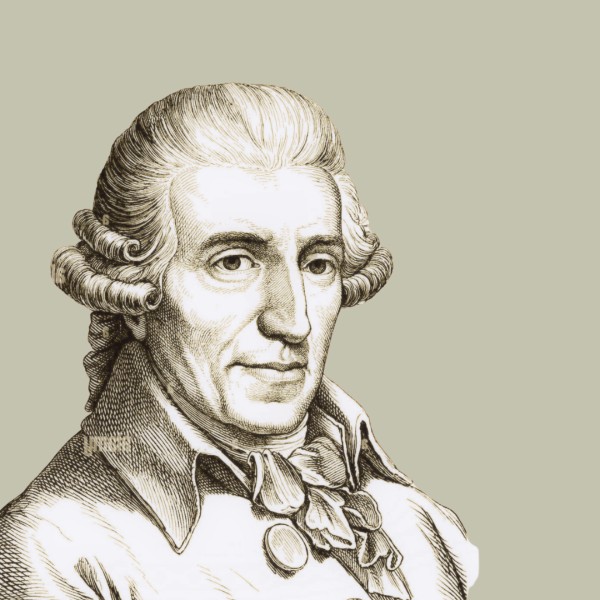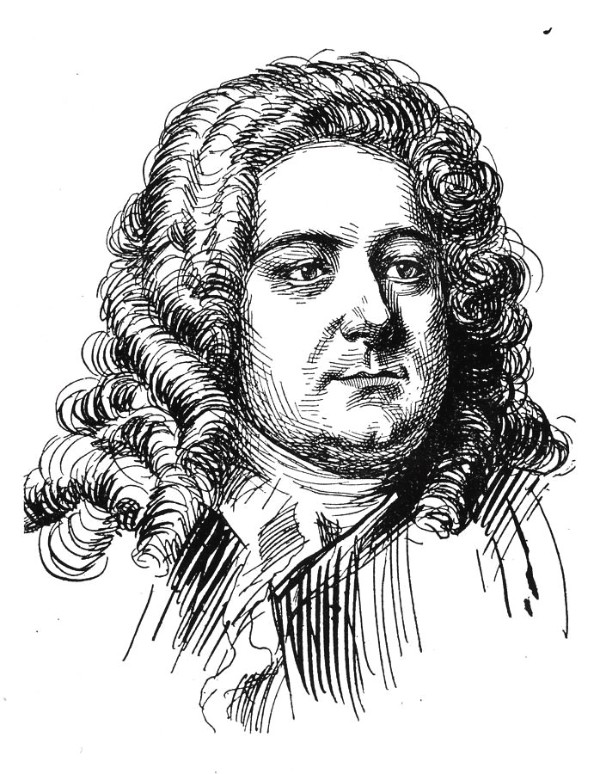Let us continue our exploration of classical music inspired by the Old Testament. According to the Hebrew Bible, Saul was the first king of the Kingdom of Israel and Judah. And as it frequently happens with royalty, at some point or another they refuse to obey the instructions of God. After God had rejected Saul as King, David the son of Jesse from the tribe of Judah enters the story. David is a skilled musician and he plays the harp to calm Saul’s troubled nerves. But immediately, Saul is suspicious of the young shepherd and is looking for ways to get rid of him.
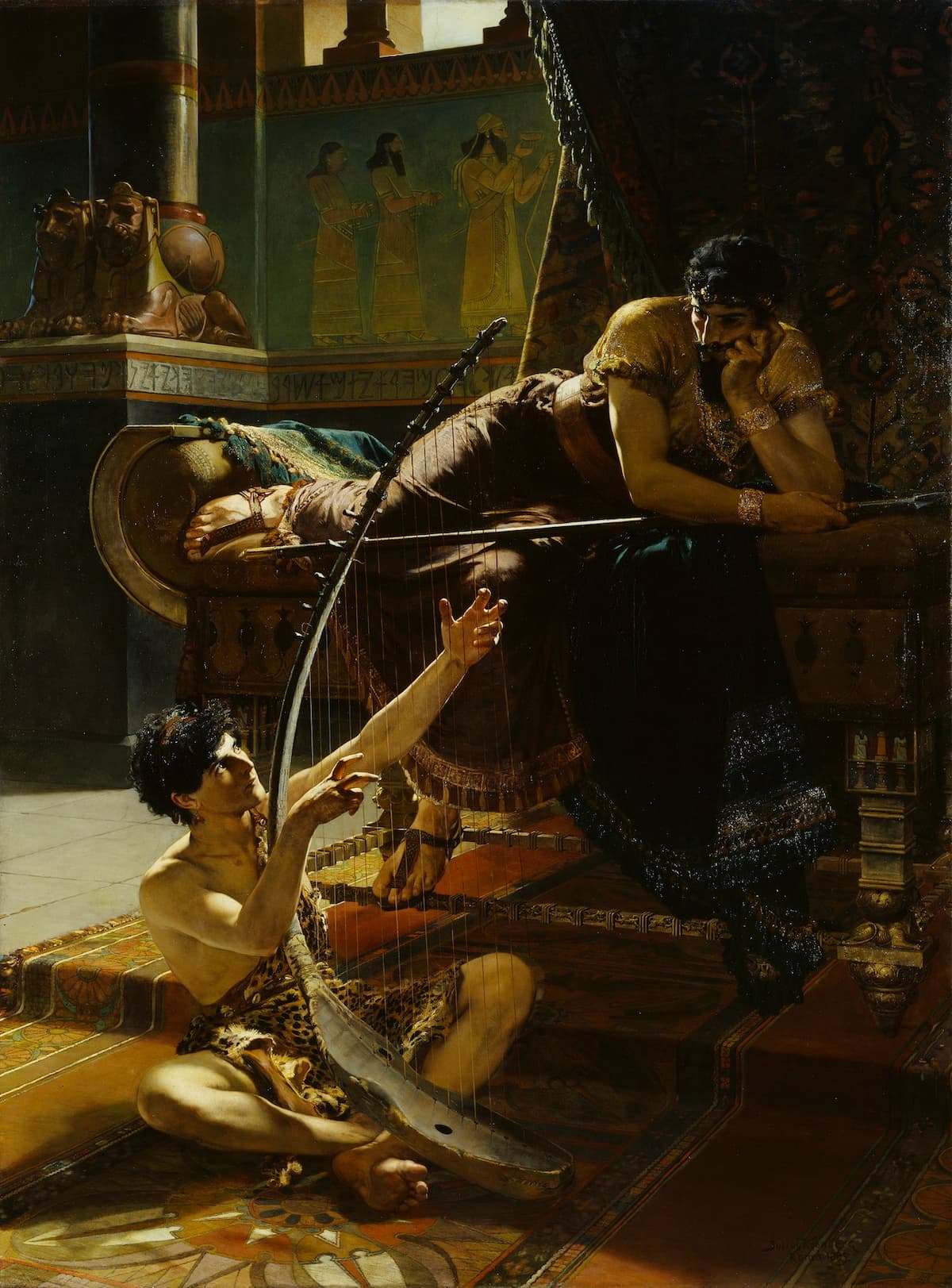
David and Saul (1885) by Julius Kronberg © Wikipedia
The opportunity arises when a large Philistine army attacks Israel, and their champion Goliath issues a challenge for single combat. Saul volunteers David, who to the surprise of everybody defeats Goliath with his slingshot. From this point on, Saul views David as a rival to the throne, and we are told that he even threw a spear at David on two occasions. With Saul increasingly resentful of David, he actively plots against him and that includes an assassination attempt. When that fails, he begins to pursuit David with an army but in the end David persuades Saul to reconcile with him, and the two swear never to harm each other.
Carl Nielsen: Saul and David, FS 25 – Act II: Prelude (Frans Andersson, bass; Niels Moller, tenor; Ruth Guldbaek, soprano; Otte Svendsen, tenor; Odd Wolstad, bass; Mogens Wedel, bass; Christen Blanke, tenor; Inge Frey, mezzo-soprano; Christine Philipsen, soprano; Danish National Radio Symphony Choir; Danish National Radio Symphony Orchestra; Thomas Jensen, cond.)
Carl Nielsen: Saul and David, FS 25 – Act II: Saa I ham, Piger? (Frans Andersson, bass; Niels Moller, tenor; Ruth Guldbaek, soprano; Otte Svendsen, tenor; Odd Wolstad, bass; Mogens Wedel, bass; Christen Blanke, tenor; Inge Frey, mezzo-soprano; Christine Philipsen, soprano; Danish National Radio Symphony Choir; Danish National Radio Symphony Orchestra; Thomas Jensen, cond.)
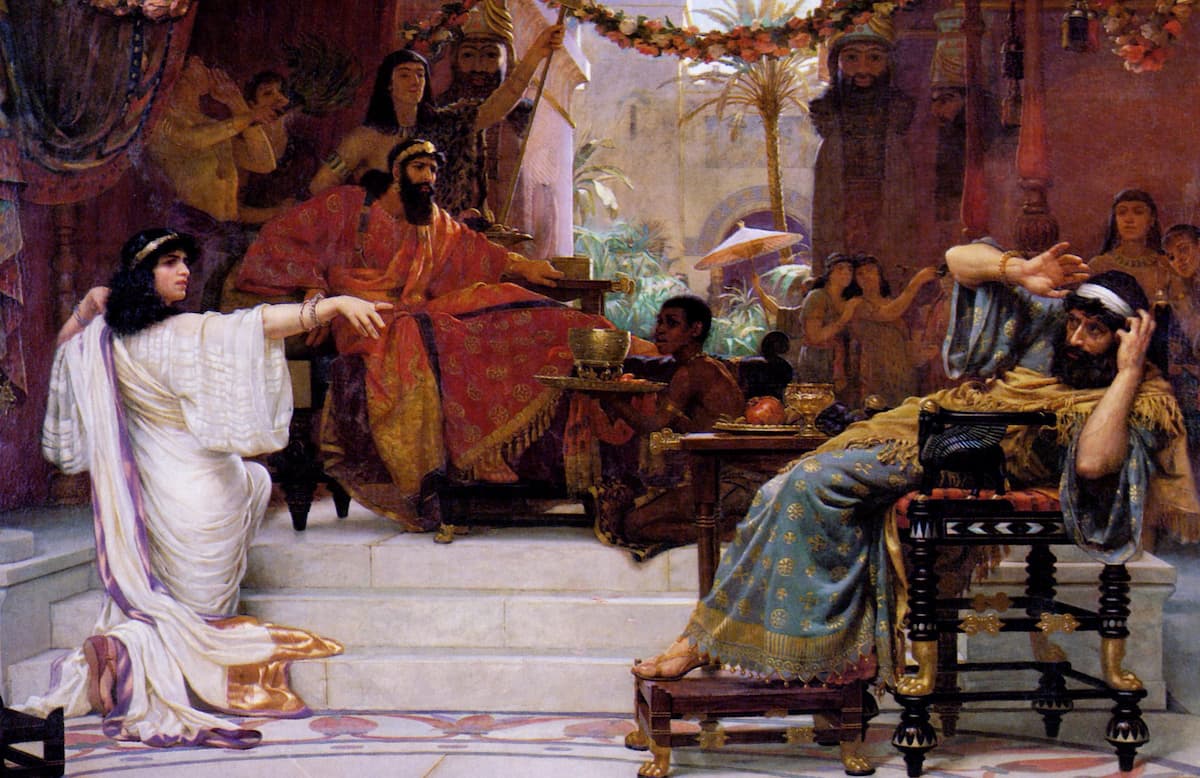
Esther Denouncing Haman by Ernest Normand © Wikipedia
The Persian King Xerxes, known as Ahasuerus in the Bible, was a hasty man with a really bad temper. When his queen Vashti refuses to obey him, he immediately sends her into exile. It goes without saying that Xerxes needed another queen, and his eyes fall on Esther, a Jewish girl from the house of Mordecai and the tribe of Benjamin. Xerxes falls hopelessly in love with her and makes her his queen. Through her cousin Mordecai, Esther learns of an assassination attempt on Xerxes’ life and swiftly informs the King. However, the King’s chief advisor, Haman, is offended by Mordecai and gets permission from Xerxes to kill all the Jews in the kingdom. Xerxes does so without knowledge of Esther’s Jewish origins. The law is passed, and Mordecai informs Esther who organizes a large banquet. When Xerxes say that he will give her anything she wants, she asks the king to spare her life and that of all the Jews. Haman is put to death and Mordecai becomes Xerxes’ highest advisor. A new order is set out that the Jews can assemble and defend themselves, killing anyone who threatens them.
George Frideric Handel: Esther (1718 Version) (Patrizia Kwella, soprano; Drew Minter, counter-tenor; Anthony Rolfe-Johnson, tenor; Paul Elliot, tenor; Andrew King, tenor; Ian Partridge, tenor; David Thomas, bass; Emma Kirkby, soprano; Westminster Cathedral Boys Choir; Academy of Ancient Music Choir; Academy of Ancient Music; Christopher Hogwood, cond.)
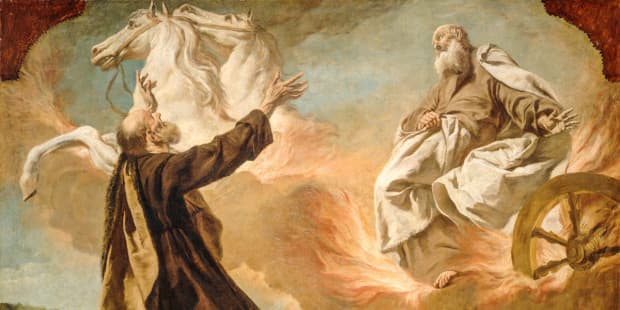
Elijah Taken Up in a Chariot of Fire, c. 1740/1755 by Giuseppe Angeli
From the books of Kings in the Old Testament comes the story of the prophet Elijah. King Ahab of Israel was not a particularly pleasant fellow, and he certainly enjoyed a rather sinful life aided by his wife Jezebel. She was the daughter of the King of Zidon and worshiped the god Baal. Jezebel was particularly angry with worshippers of the Lord God of Israel, and actively persecuted and killed the prophets of the Lord. It was around that time that Elijah suddenly appeared, and he bluntly told King Ahab that no more rain would fall upon the ground. Elijah also resurrects a dead youth, challenges the priests of Baal to a contest on Mount Carmel, and eventually brings rain to parched Israel. Elijah is fiercely prosecuted by Queen Jezebel, and flees into the desert. Yet, a vision of God appears and urges him to return to his prophetic work. In the end, Elijah ascends into heaven in a fiery chariot. At least those are the episodes of the prophet’s life that appealed most to Felix Mendelssohn.
Felix Mendelssohn: Elijah – Part II: Aria: Hear ye, Israel (Yvonne Kenny, soprano; Academy of St. Martin in the Fields Orchestra; Neville Marriner, cond.)
Felix Mendelssohn: Elijah – Part II: Be not afraid, saith (Academy of St. Martin in the Fields Chorus; Academy of St. Martin in the Fields Orchestra; Neville Marriner, cond.)
Felix Mendelssohn: Elijah – Part II: But the Lord from the north hath raised one (Academy of St. Martin in the Fields Chorus; Academy of St. Martin in the Fields Orchestra; Neville Marriner, cond.)
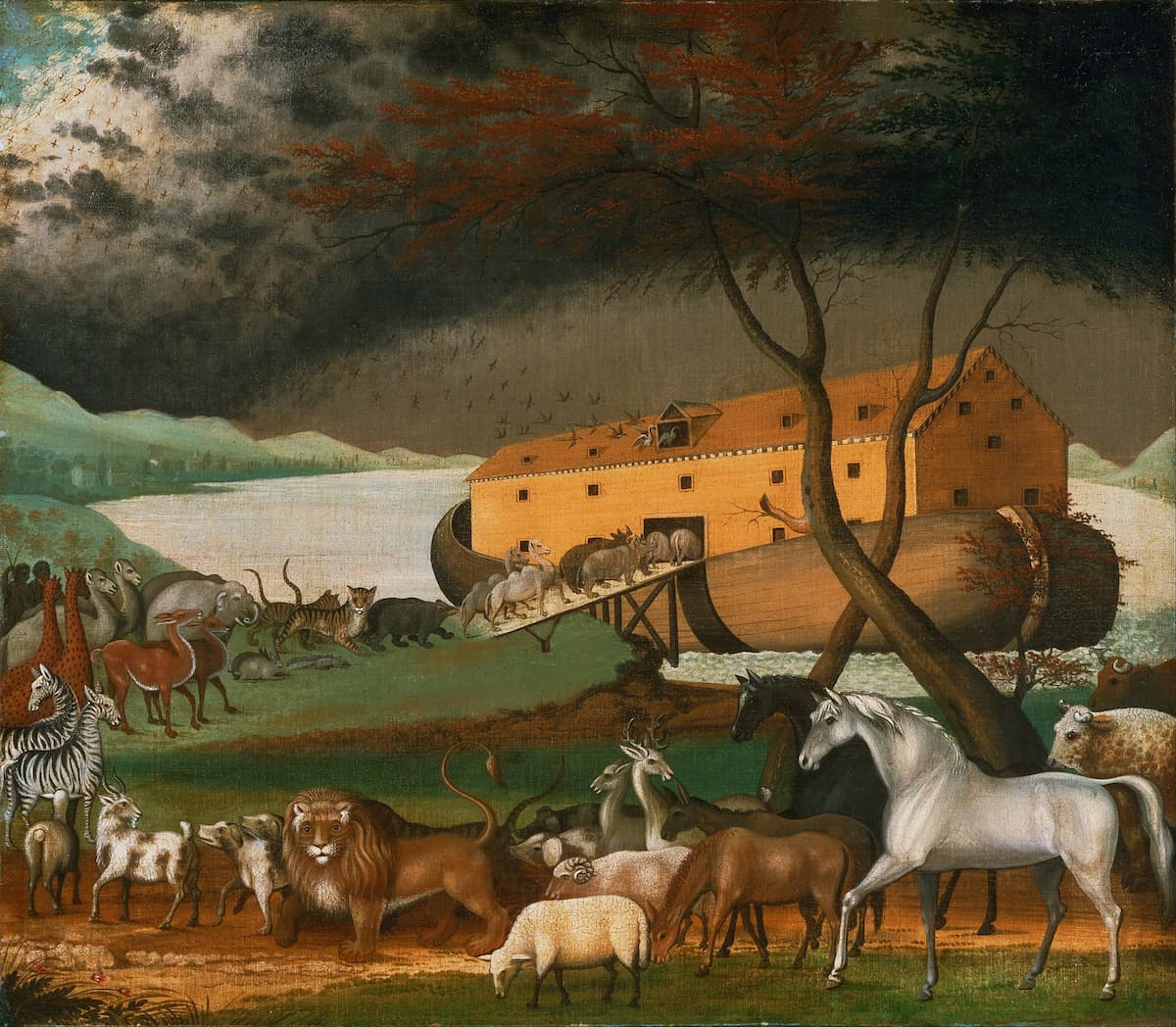
Noah’s Ark (1846), by Edward Hicks © Wikipedia
One of the most endearing stories in the Old Testament comes from the book of Genesis and describes the forthcoming destruction of a sinful world. That destruction arrives in the shape of a great flood, and God instructs Noah to build a giant Ark. God said to Noah, “the time has come when all the men and women on the earth are to be destroyed. Every one must die, because they are all wicked. But you and your family shall be saved, because you alone are trying to do right.” Noah labored faithfully to build the Ark at God’s command, ultimately saving not only his own family, but also mankind itself and all land animals from extinction during the flood. You all know this part of the story, but did you know that after Noah had found land he planted a vineyard? He drank lots of wine made from his vineyard, fell into a drunken stupor, and cursed his grandson. In many religious narratives, Noah is excused because he is considered to be the first wine drinker, and the person to discover its intoxicating effect.
Benjamin Britten: Noye’s Fludde (The Congregation; The English Opera Group Orchestra; Norman Del Mar, cond.; Trevor Anthony, narrator; Owen Brannigan, bass; David Pinto, boy soprano; Darian Angadi, boy soprano; Stephen Alexander, boy soprano; Caroline Clack, soprano; Eileen O’Donovan, soprano; Sheila Rex, mezzo-soprano; Chorus of Animals; Kathleen Petch, soprano; Marie-Therese Pinto, soprano; Patricia Garrod, soprano; Margaret Hawes, soprano; Gillian Saunders, soprano)
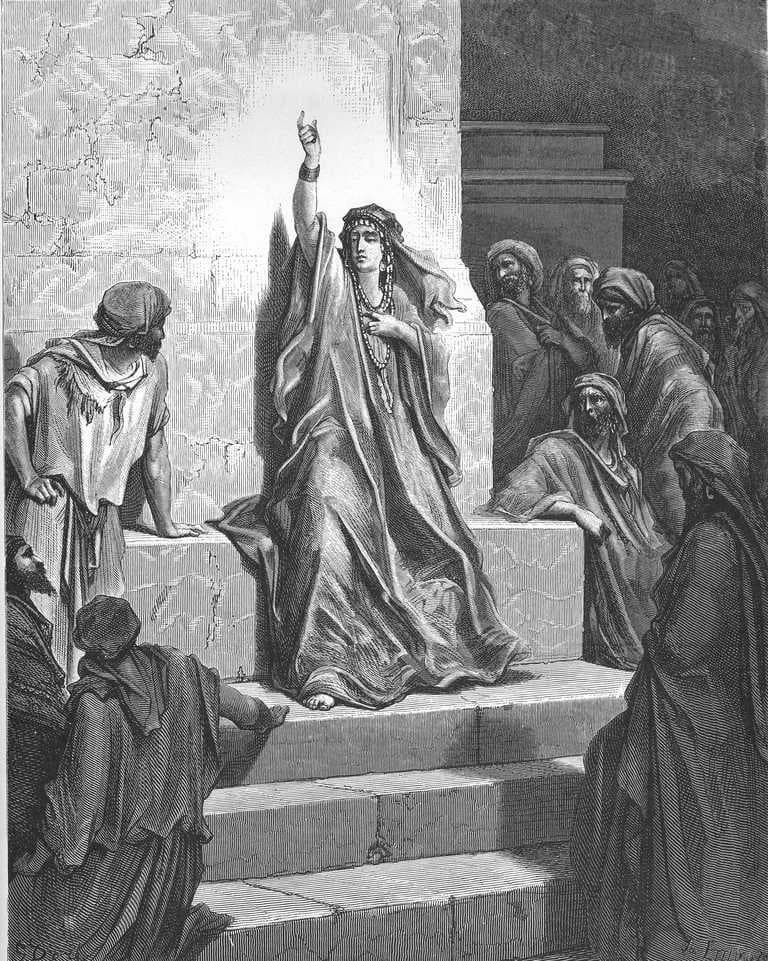
Deborah Praises Jael by Gustave Doré © Wikipedia
One of Handel’s most successful early Oratorio Deborah is based on a story found in the Book of Judges. When the children of Israel gather before Deborah—a prophetess and Judge—she foretells the death of the Canaanite commander Sisera at the hands of a woman. The Israelites have been in captivity by the Canaanites for over 20 years and gathering forces to go to war. Sisera, attended by Priests of Baal and worshipper demands submission, but Deborah tells him to go away. Barak and Deborah are chosen to lead the Israelite army, and they are victorious. When Sisera recognizes that the battle is lost, he leaps from his chariot and flees on foot. In the distance he sees a tent, and runs towards it for shelter. That tent is home to a man named Heber and his wife Jael. Sisera enters the tent and Jael covers him with rugs so that the enemy might not find him. However, while he is sleeping, Jael drives a nail through his temples, fulfilling Deborah’s prophecy.
George Frideric Handel: Deborah – Part I: Overture (Frankfurt Baroque Orchestra; Joachim Carlos Martini, cond.)
George Frideric Handel: Deborah – Part I: Chorus – Immortal Lord of earth and skies (Kantorei Junge, choir; Frankfurt Baroque Orchestra; Joachim Carlos Martini, cond.)
George Frideric Handel: Deborah – Part I: Air – Cease, O Judah, cease thy mourning (Elisabeth Scholl, soprano; Frankfurt Baroque Orchestra; Joachim Carlos Martini, cond.)
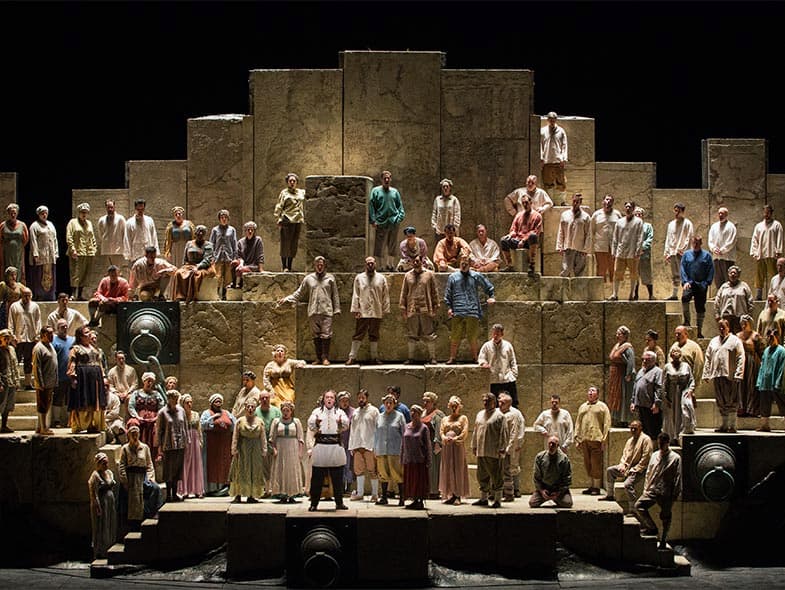
Verdi’s Nabucco performed at the MET
The opera Nabucco, following the plight of the Jews as they are assaulted, conquered, and subsequently exiled from their homeland by the Babylonian King Nebuchadnezzar, established Verdi’s reputation as a composer. What a great story and what great music. Nabucco (Nebuchadnezzar II) has conquered Jerusalem and is on his way to the temple. The High Priest Zaccaria holds Nabucco’s daughter Fenena hostage, and threatens to stab her if Nabucco will enter the temple. Fenena’s older sister Abigaille discovers that she is actually the daughter of a slave, and she tries to incite an open rebellion against her father. In the meantime, Zaccaria succeeds in converting Fenena to the Jewish faith. Nabucco returns and declaring himself to be a god; he quickly descends into mental illness and condemns the Hebrews to death. Abigaille takes Nabucco prisoner while the Hebrews lament their fate on the banks of the Euphrates River. Fenena is led to the place of execution, but is saved by Nabucco, who grants the Hebrews their freedom. Abigaille meanwhile, has poisoned herself.
For more of the best in classical music, sign up for our E-Newsletter
Giuseppe Verdi: Nabucco (Highlights) (Renata Scotto, soprano; Elena Obraztsova, mezzo-soprano; Matteo Manuguerra, baritone; Veriano Luchetti, tenor; Nicolai Ghiaurov, bass; Anne Edwards, soprano; Kenneth Collins, tenor; Robert Lloyd, bass; Ambrosian Opera Chorus; Philharmonia Orchestra; Riccardo Muti, cond.)

